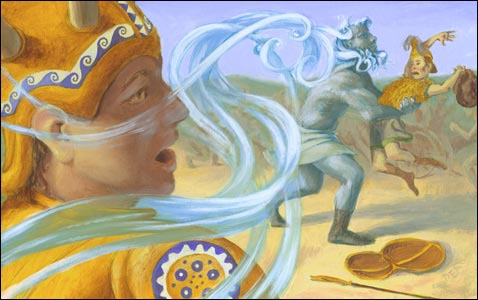|
|

|
|
|

|
|
|

|
|
|
|
Book Twenty
|
|
|
|
While the Greeks surge out of their encampment with Achilles (a-KIL-eez) in the lead, Zeus (zyoos) calls a council on Olympus. All the gods attend, not just the supreme twelve — excepting Hades (HAY-deez), who remains in the Underworld — but every river god and every nymph of grove or spring or meadow. Zeus instructs them to choose up sides and join the battle of mortals. Otherwise, Achilles is destined to topple Troy before its fated hour. Hera (HEER-uh), Athena (a-THEE-nuh), Poseidon (puh-SY-dun), Hermes (HUR-meez), and Hephaestus (he-FEES-tus) align themselves with the Greeks. Ares (AIR-eez), Aphrodite (a-fro-DY-tee), Artemis (AR-teh-mis), Leto (LEE-toh), and the river Xanthus (ZAN-thus) join the Trojans.
|
|
|
|
Adding to the mortal din, Zeus sends down huge volleys of thunder from on high, while Poseidon, god of earthquakes, shakes the ground so violently that Hades, king of the dead, jumps up from his underworld throne in terror. He fears that the earth will split open and reveal the dreadful sight of the dank, rotting realm of the dead, which revolts the gods themselves. Apollo, temporarily in mortal guise, urges Aeneas (ee-NEE-us) to go up against Achilles, overcoming the Trojan's initial disinclination with the thought that he is more closely related to Zeus, being the son of Aphrodite, whereas Achilles' mother Thetis (THEH-tis) is merely the daughter of the Old Man of the Sea.
|
|
|
|
Aeneas faces Achilles and they exchange a long series of boasts and taunts. Aeneas cites his pedigree, tracing his family back to Dardanus (DAR-da-nus), a son of Zeus. He touches upon the fact that his ancestor Ganymede (GAN-i-meed) was so handsome that the gods snatched him up to Olympus to be cup-bearer to Zeus. He concludes by explaining that he and Hector are cousins. The long-winded preliminaries at an end, he hurls his spear straight at Achilles' shield, but the god-made armor withstands the terrific blow. Achilles' spear in return runs straight through Aeneas' shield, and Aeneas barely dodges the point. He is shaken by the close call but snatches up a boulder — such that no two men could lift today — and prepares to fend off Achilles' sword. He is clearly no match for Achilles, whose armor will easily deflect the rock while his sword slashes home, but at the fatal moment Poseidon intervenes.
|
|
|
|
The god is lined up against the Trojans, but he has no particular grudge against Aeneas. And he is indignant that Apollo has urged the man on towards his doom, only to abandon him. Then there is the consideration that Zeus might be angry if Achilles kills this descendant of his favorite son who is destined in future years to rule Troy. Once again it is a matter of the gods intervening so that Fate retains its inevitability. Poseidon obscures Achilles' eyesight with a mist, snatches up his spear, and lays it at his feet, while hurling Aeneas to the outer limits of the battle. The god comes up beside him where he lands and warns him not to be so foolhardy as to face Achilles again. He returns to Achilles and removes the mist from his eyes. Startled at first to find his own spear at his feet, he realizes that Aeneas' claims of being favored by the gods are true enough. He is indifferent to the fact, since there are so many other Trojans to kill.
|
|
|
|
In short order he downs three Trojans, one a prince of the royal house. Hector is enraged to see his younger brother slain, and he challenges Achilles straightaway. But Athena wafts away his spear with a godly breath. And when Achilles attacks in return, Apollo wraps Hector in mist, so that Achilles' spearthrusts cannot find their target. Somewhat less indifferent this time to the snatching away of his quarry, Achilles once again contents himself with other victims. Four are cut down in rapid succession. A fifth clutches his knees in the traditional gesture of supplication, but Achilles' blade has no mercy. His spear gores the next man in one ear and out the other. He splits a man's skull with his sword, sends another head flying as the spinal fluid oozes out from the severed neckbone. And on he rampages, as the ground runs so thick with blood that his chariot wheels send it spraying.
|
|
|
|
|
|
|
|
|
|
|

|
|
|

|



